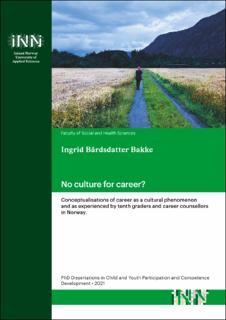| dc.description.abstract | This thesis asks how does culture work as a context for conceptualisations of career, and how does this relate to the implementation of the concept of career in Norwegian schools in the experience of tenth graders and career counsellors? The thesis consists of four papers and this synopsis. The papers investigate Norwegian culture, examine how cultural values surface in discussions about career choices; and explore how tenth graders and school counsellors understand the career concept. Career guidance and learning are situated in the Norwegian education system, where there have been significant developments concerning career education over the last decades. The focus of the thesis is split between a macro and a micro level, and it addresses the philosophical and ideational underpinnings of Norwegian culture and it also addresses tenth graders about to transition into upper secondary and their counsellors. The synopsis draws the theories and findings from interviews with tenth graders and counsellors together with the theoretical investigation. It proposes a conceptual framework for understanding how culture influence the formation of the career concept. As such, the thesis follows both a theoretical and an empirical line of inquiry.
The study explores the uneasy position of career in Norwegian culture. It also explores the way that theories of career and career learning have travelled the world and shows that when theories transfer between contexts, the results may be unexpected. The study argues that while the development of Norwegian career guidance has focused on structure, discussions on the content of career theories have emerged more recently and that the question of 'what is career' in Norway is of importance. The philosophical perspective of phenomenology is used together with theories on concept formation, career and culture to develop a conceptual framework. Proposing a model that connects these concepts and illustrates how culture works as a framework for the conceptualisation of career, the study argues that such a framework guides thinking about both the ideational content and the concrete events. In other words, career concepts and theories can potentially connect to the lived experience of career but seeing concepts as relevant is important to make this happen.
Discussing the research questions, the thesis argues that a big and defining narrative of the Norwegian culture is the relationship between the 'I' and the 'we', or the idea that individuals are autonomous within a framework of responsibility. Further, a democratic career concept is discussed, encompassing danning as a central idea as it has agency for educators to help students develop citizenship. However, as lived experience and career concepts are in a reciprocal relationship of meaning making, an understanding of democratic career concept as informed by lived career is proposed. | en_US |
